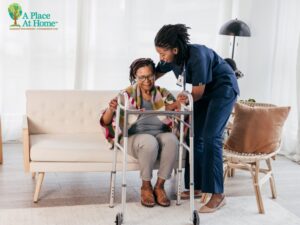
Dementia is a progressive condition that affects millions of families worldwide. As your loved one experiences memory loss, confusion, and challenges with daily activities, you may have many questions. This blog will address some of the most common concerns about dementia, including how long someone can live with it, whether recovery is possible, the stages of dementia, and how quickly it progresses. Understanding dementia can help provide clarity, reduce anxiety, and guide you to the right care for your loved one.
How Long Can a Person Live with Dementia?
One of the most frequently asked questions families have is, “How long can a person live with dementia?” While the progression of dementia is different for everyone, it’s important to understand that life expectancy can range from several years to over a decade after symptoms first appear.
Factors That Influence Life Expectancy
- Type of Dementia: Alzheimer’s disease is the most common form of dementia and typically progresses more slowly than other types such as vascular dementia or Lewy body dementia.
- Age and Overall, Health: Older individuals may experience faster progression, especially if they have additional health conditions like heart disease or diabetes.
- Quality of Care: Access to professional care, a supportive home environment, and proper medical attention can greatly impact how well a person lives with dementia, potentially extending life expectancy.
Although dementia is irreversible, individuals can live comfortably for many years with the right support system in place.
Can a Person Recover from Dementia?
Unfortunately, dementia is not curable at this time. It is a progressive neurological condition, meaning it will worsen over time. However, there are treatments available that can help slow the progression and manage symptoms, especially in the early stages.
Managing Symptoms and Slowing Progression
- Medications such as Donepezil and Memantine can improve symptoms or slow decline in some people, particularly in the early and middle stages of Alzheimer’s disease.
- Cognitive therapies and physical activities can help improve memory and maintain independence for longer.
- Supportive care—like memory aids, home modifications, and social engagement—can also make a significant difference in enhancing quality of life.
While recovery from dementia isn’t possible, effective management can enable individuals to live with dignity and experience an improved quality of life.
When do people with dementia begin sleeping more frequently?
One of the challenges of caring for a loved one with dementia is dealing with changes in sleep patterns. Increased sleep is often a sign of the later stages of dementia, but it can happen at any point.
Sleep Changes Throughout the Stages of Dementia
Early Stages: Sleep changes are often subtle. Individuals may start to sleep a bit more but can still maintain normal sleep-wake cycles.
Middle Stages: As dementia progresses, seniors may experience excessive daytime sleepiness and restlessness at night, a phenomenon known as sundowning.
Late Stages: In the final stages, individuals with dementia may sleep up to 12-14 hours a day, and their circadian rhythms may be completely disrupted. This can be a natural part of the disease, though it may also be linked to other health concerns like infections or depression.
If your loved one’s sleep patterns suddenly change or become disruptive, consult a healthcare provider to rule out any underlying conditions.
How rapidly does dementia get worse over time?
Dementia progresses at different rates depending on several factors, including the type of dementia, the individual’s age, overall health, and the support they receive. For most people, dementia follows a gradual progression over several years.
Stages of Dementia and How Quickly It Progresses
Mild (Early Stage): In the early stages, individuals may experience minor memory lapses, confusion, and difficulty with complex tasks. This stage can last for several years.
Moderate (Middle Stage): As dementia progresses, individuals may have difficulty performing daily tasks, such as dressing, eating, and remembering important details like family members’ names. This stage may last several years.
Severe (Late Stage): In the final stage, individuals may lose the ability to communicate, recognize family members, or take care of themselves. Full-time care is often required at this stage.
On average, individuals with Alzheimer’s disease live 4-8 years after diagnosis, but some can live longer. It’s essential to monitor symptoms and adjust care accordingly.
Additional Common Questions About Dementia
- Can a person with dementia still recognize family members?
In the early stages, most people with dementia can recognize their loved ones, but as the disease progresses, memory loss may cause difficulty recognizing familiar faces, even those of close family members. - What are the first signs of dementia?
The first signs often include forgetting recent conversations or events, becoming confused about time and place, and difficulty performing daily tasks such as cooking or managing finances. - Can people with dementia live alone?
It’s possible for individuals in the early stages of dementia to live alone, especially with assistance. However, as the disease progresses, most people with dementia will require help with daily activities and need a caregiver present to ensure their safety. - How do you know if someone has dementia?
Early signs of dementia include memory lapses, difficulty with concentration, and changes in mood or personality. A healthcare professional can diagnose dementia through neurological exams and cognitive tests. - Can dementia be prevented?
While there’s no surefire way to prevent dementia, certain lifestyle choices may reduce the risk. Regular physical activity, a balanced diet, staying mentally active, and avoiding smoking can help reduce the risk of dementia. - What’s the difference between Alzheimer’s and dementia?
Dementia is an umbrella term for symptoms of impaired memory, reasoning, and communication skills, while Alzheimer’s disease is a specific type of dementia that accounts for about 60-80% of all dementia cases.
Conclusion
Dementia can be an overwhelming diagnosis, but understanding its progression and symptoms can make caregiving more manageable. While there’s no cure, early diagnosis, medications, and supportive care can help manage the symptoms and improve your loved one’s quality of life. Always consult healthcare professionals and consider home care options to ensure your loved one receives the best possible care.
If you need further support or assistance with dementia care, contact a local dementia care provider or caregiving agency today. We’re here to help every step of the way.
Also Read: Is Forgetting Names a Sign of Dementia?






No comment yet, add your voice below!